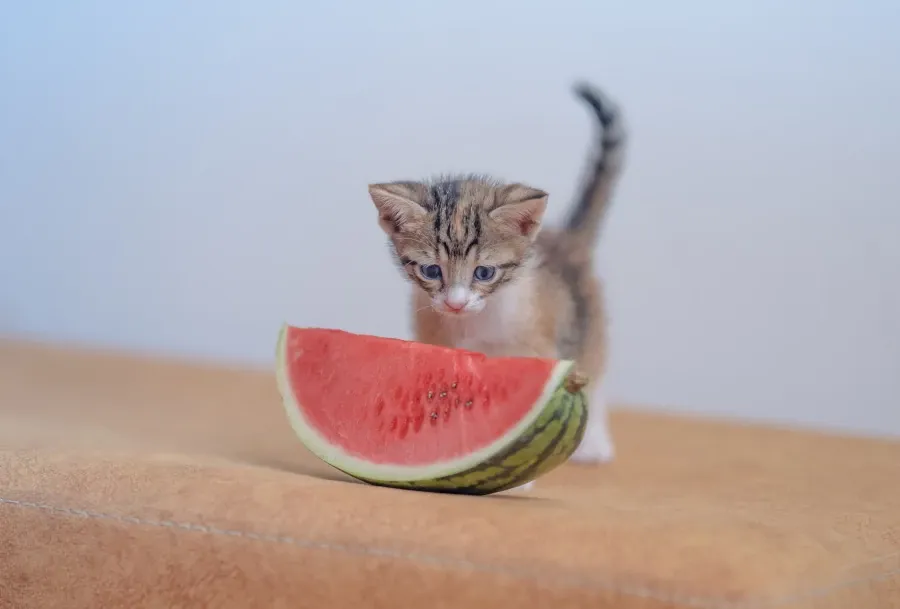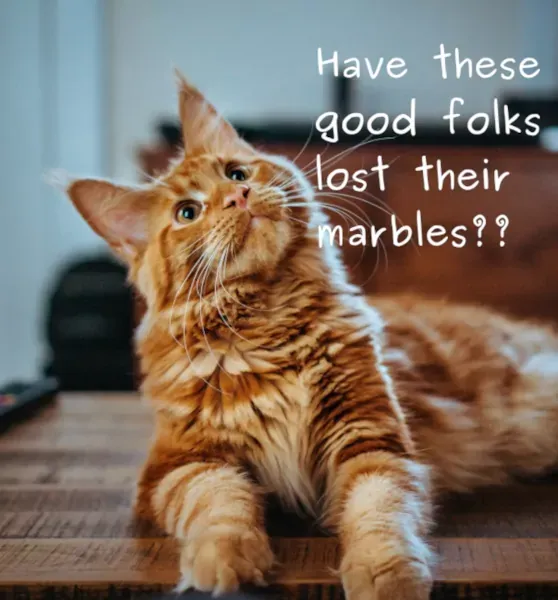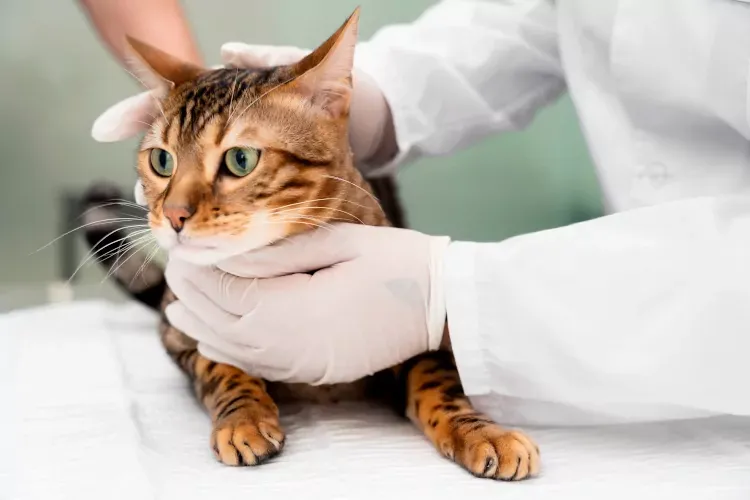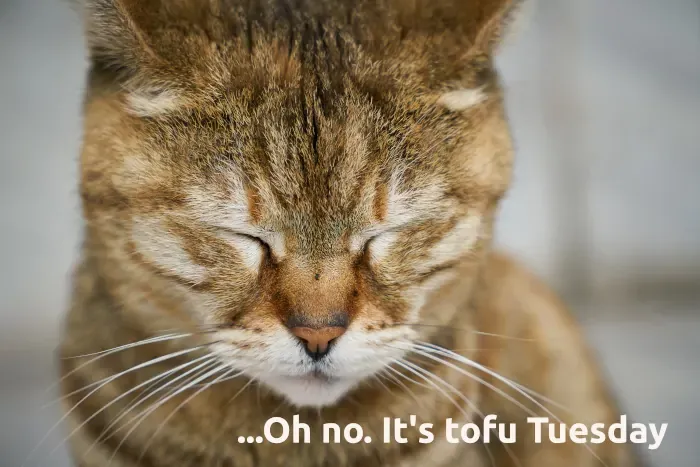Can Cats Eat a Vegan Diet? - Pt. 1: The Dangers
NEVER feed house cats plant-based diets. As hyper carnivores, they need quality animal protein for health and longevity. Plant nutrients simply don’t cut it and cats are unable to utilise them effectively. When forced into vegan or vegetarian diets, cats can become seriously ill.

An incontestable fact about all cats – big and small – is that they are obligate carnivores. As such, they need meat for survival.
...the carnivorous ancestry of the house cat
The Ancestry section features four blog posts that delve deeply into the cat’s status and adaptations as obligate carnivores. If these posts are not proof enough that cats should not eat plants, then I don’t know what is.
It does not get any clearer than that!
...plants are great – for plant eaters
Vegetables and fruit are great. They provide us with vitamins, minerals, antioxidants and phytochemicals. Some argue that a diet is not ‘clean’ unless it is an all plant diet.
And that’s fine, for humans who choose to eat this way. But what is great for one species can be to the detriment of another. Put plainly, plant matter wreaks havoc on the physiology of meat eating species.

...cats are unable to process plant foods
Not a single cat on the face of the earth has evolved to eat anything other than animal tissues 1, 2.
On the entire planet, there is no such thing as a plant eating cat 3, only cats forced into vegan and vegetarian lifestyles.
...plants are inappropriate to hyper carnivores
To keep cats healthy, they need a biologically appropriate diet, free from inappropriate foods. These include ultra processed foods, artificial ingredients, synthetics, chemicals and preservatives.
Another highly inappropriate food for cats is plant matter. And we should eliminate it – not feed more of it!
...plants are mostly useless to cats
Cats lack the enzymes to fully digest and assimilate plant foods 4. Plant nutrients are poorly absorbed and not adequately bioavailable to cats.
Some plant nutrients – like cysteine, linoleic acid and carotenoids – are worthless as cats lack the metabolic processes to convert them to usable forms 5, 6. They subsequently require them in active, animal form.
...others are plain harmful
Unlike plant eaters, cats are unable to neutralise harmful plant defences that interfere with digestion and nutrient assimilation – such as lectins, oxalates, phytates and protease inhibitors, to name a few.
Subsequently, cats run the risk of health complications, gastrointestinal damage and nutrient deficiencies 7.
...cats can't thrive on plants
Sure, plants can keep cats alive – even for years. But cats are very unlikely to thrive on meatless diets 8. Plant foods place their metabolic systems under tremendous pressure 9, which result in survival mode functioning.
Eventually health is broken down and quality of life is deteriorated.
...empty calories lead to health problems
Because cats lack the ability to assimilate plant matter, their bodies are largely inundated with empty calories that facilitate malabsorption and associated problems.

Cats overeat plant foods, not because they love them, but as attempts to satisfy their high nutritional demands with inferior foods.
...carbohydrates are especially damaging
The more plants and carbohydrates cats ingest, the greater the likelihood of pancreatitis, obesity or diabetes 10.
It also leads to muscle wasting where a lack of animal protein triggers the cat's own muscle tissue to be broken down to meet protein demands 11.
On top of this, carbohydrate rich foods are extremely inflammatory to cats 12. They consequently develop arthritis or inflammatory bowel disease 13 – devastating, but all too common diseases.
In fact, Dr Claudia Ugarte found a strong correlation between inflammatory bowel disease and carbohydrate malabsorption in cats 14.
Inflammatory bowel disease, in turn, is often a precursor for intestinal cancer or lymphoma 11, which is also common in cats.
...plants and struvite crystals in cats
Owed to the alkalinity of plant proteins, cats on plant diets develop abnormally alkaline urine 15. When this happens, excessive struvite crystal formation is caused.
To counteract resultant alkalinity, cat food manufacturers add acidifiers to food. Clever, right? Not so much.
...pH is difficult to get right
Urinary acidifying taken too far causes calcium oxalate stones 16. On top of this, many plant foods in themselves are high in oxalates. When they leave the body, they bind to calcium 17.
This adds a further risk for excessive crystal formation.
Warning: These crystals often accumulate into stones that can cause life threatening urinary blockages 15.
...so why the vegetables in cat food then?
Dr Lisa Pierson 18 feels that vegetables are not used in cat food because they are healthy to cats, but rather because they are cheaper than meat.
They also appeal to our perceptions of what is healthy and wholesome.
...pet food companies rise to the occasion
To make matters worse, pet food manufacturers are eagerly meeting the demand for vegan cat food 19. The mere existence of these foods signal to cat carers that they are healthy and safe.
However, consumers are misled into believing that plant-based products for cats are as nutritious as meat. This is a lie that is putting cats at risk.
Professor Marge Chandler, clinical pet nutritionist and lecturer, firmly states that meat is irreplaceable in the cat's diet 20.

...plants dressed up as meat is not meat!
Man-made foods can never live up to real, live foods – no matter what manufacturers say. Our knowledge of nutrition is far too limited and our understanding of nutrient functioning too incomplete.
As Aristotle said thousands of years ago, the whole is greater than the sum of its parts. There is a complex interplay between nutrients in real food that scientists have yet to understand 21.
It is this nutrient synergy that man-made, ultra processed foods can never replicate. Man's best efforts will always fall short of nature's ingenuity.
The only way to come close to meat, is with meat.
...wealth before health
Whether or not foods are healthy long term is unimportant to pet food companies. Their primary goals are increased sales and growing stakeholder profits.
But the RSPCA warns that cats fed vegan foods could become seriously ill 20.
Plant-based cat foods are inappropriate, novelty foods that simply do not provide cats with the required nourishment for well-being 19, no matter what the packaging says.
...but my cat loves fruit and vegetables
Against all odds, some cats seem to enjoy fruit and vegetables. This important issue is explored further in the upcoming post Why Does My Cat Eat Vegetables?
The problems discussed thus far are only the tip of the iceberg. Our Nature Mimicking course also looks at plant foods in the cat's diet in greater depth and explains why cats can't thrive on vegetables like their canine besties.
It also explains the pitfalls of plant foods for cats. As will be seen, even small amounts of vegetables and fruit in the cat’s diet is controversial – let alone an all plant diet!
...what's next?
The next blog post Can Cats Eat a Vegan Diet? Pt. 2 – The Ethics looks at vegan diets for cats from an ethical standpoint.


References
1 Sunquist, M. E. & Sunquist, F. (2002). Wild cats of the world: The ultimate reference to every species worldwide. Chicago: University of Chicago Press.
2 Hunter, L. (2015). Wild cats of the world. London: Bloomsbury Publishing Plc.
3 Kaspar, M. (2014). No bull, taurine is a must for kitty. In Feline Nutrition Foundation. Retrieved January 30, 2019, from https://feline-nutrition.org/nutrition/no-bull-taurine-is-a-must-for-kitty
4 Hewson-Hughes, A.K., Hewson-Hughes, V.L., Miller, A.T., Hall, S.R., Simpson, S.J. & Raubenheimer, D. (2011). Geometric analysis of macronutrient selection in the adult domestic cat, Felis catus. Journal of Experimental Biology, 214, 1039 – 1051.
5 Morris, J.G. (2002). Idiosyncratic nutrient requirements of cats appear to be diet-induced evolutionary adaptations. Nutrition Research Reviews, 15, 153 – 168.
6 Morris, J.G. (2001). Unique nutrient requirements of cats appear to be diet-induced evolutionary adaptations . Recent Advances in Animal Nutrition in Australia, 13, 187 – 194.
7 Bichell, R.E. (2013). When edible plants turn their defences on us. In NPR. Retrieved February 24, 2022, from https://www.npr.org/sections/thesalt/2013/10/01/228221063/when-edible-plants-turn-their-defenses-on-us
8 Dowling, S. (2020). Can you feed cats and dogs a vegan diet? In BBC. Retrieved February 11, 2022, from https://www.bbc.com/future/article/20200304-can-you-feed-cats-and-dogs-a-vegan-diet
9 Griffiths, S. & Ruish, D. (n.d.). Evolutionary nutrition for the cat. In Club Canine. Online booklet retrieved April 29, 2015. Shortened/revised version available from http://www.clubcanine.net/ evolutionary-nutrition-cats.shtml
10 Becker, K.S. (2016). The healthiest diet for your cat. In The Huffington Post. Retrieved July 6, 2016, from http://www. huffingtonpost.com/dr-karen-becker/healtthy-cat-diet_b_865604.html
11 Dion, T. (2014). Raw feeding your house-cat: What's all the fuss about? In Cat Centric. Retrieved March 13, 2023, from https://catcentric.org/nutrition-and-food/raw-feeding/raw-feeding-your-house-cat-whats-all-the-fuss-about/#1
12 Taylor, B. & Becker, K.S. (2013). Dr Becker's real food for healthy dogs and cats: simple homemade foods (4th ed). United States: Natural Pet Productions.
13 Goldstein, L. (n.d.). Why feed our cat a raw diet. In Food fur Life. Retrieved February 11, 2022, from https://www.foodfurlife.com/why-feed-your-cat-a-raw-diet.html#/
14 Ugarte, C., Guilford, W.G., Markwell, P. & Lupton, E. (2004). Carbohydrate malabsorption is a feature of feline inflammatory bowel disease but does not increase clinical gastrointestinal signs. The Journal of Nutrition, 134, 2068S – 2071S.
15 May, A. (n.d.). Vegan diets and cats. In Vegan Outreach. Retrieved March 10, 2023 from https://veganoutreach.org/vegan-diets-cats/
16 Coates, J. (2015). The effects of diet on bladder stones in cats. In PetMD by Chewy. Retrieved March 10, 2023, from https://www.petmd.com/blogs/nutritionnuggets/cat/dr-coates/2015/february/effects-diet-bladder-stones-cats-32525
17 WebMD (2022). Foods high in oxalates. In Nourish. Retrieved March 10, 2023, from https://www.webmd.com/diet/foods-high-in-oxalates
18 Pierson, L.A. (n.d.). Commercial Cat Foods. In Cat Info. Retrieved March 3, 2022, from https://catinfo.org/commercial-cat-foods/
19 Quine, O. (2018). Pet owners who force their cats to be vegan could risk breaking the law. In The UK Telegraph. Retrieved October 24, 2019, from https://www.telegraph.co.uk/news/2018/11/23/pet-owners-feed-cats-vegan-diet-could-face-prosecution/
20 Bennett, A. (2018). Cat not got the cream: Cat owners who feed pets a vegan diet risk making their pets ill and ‘may be breaking the law’. In The Sun. Retrieved March 10, 2023, from https://www.thesun.co.uk/news/7817089/cats-vegan-diet-warning-rspca/
21 Goldstein, L. (2014). Whole bone alternatives: When and how to use them in a raw fed cat’s diet. In Cat Centric. Retrieved March 7, 2023, from http://catcentric.org/nutrition-and-food/raw-feeding/whole-bone-alternatives-when-and-how-to-use-them-in-a-raw-fed-cats-diet/
Disclaimer
The information provided on the Bestfedcats.com website is educational and informational. We are here to give guidance on how to feed a properly balanced raw diet. We also offer advice on how to improve the diet of the modern house cat. Please note that we are not veterinarians. We are not here to give veterinary advice. Best Fed Cats will not be held responsible for any adverse reactions to your cat based on the information on our website. The health of your cat depends entirely on you. We expect you to use your knowledge of your cats, their circumstances and their health – in conjunction with a trusted veterinarian – to determine if any advice provided on this site is appropriate for your cats.

